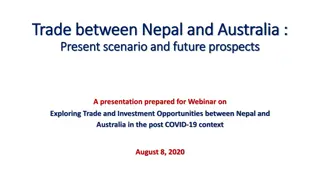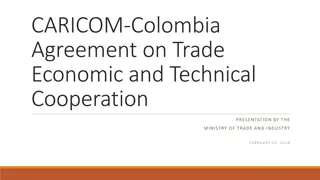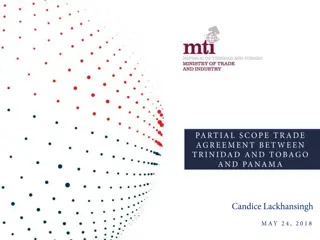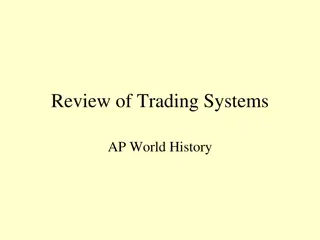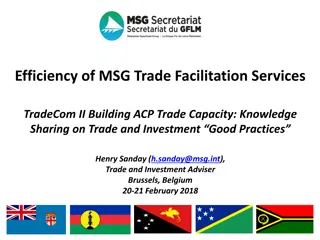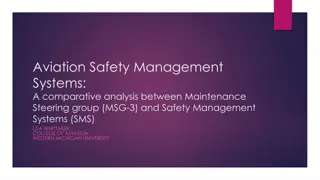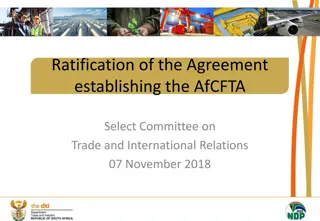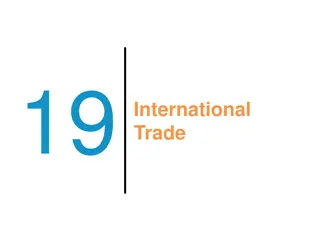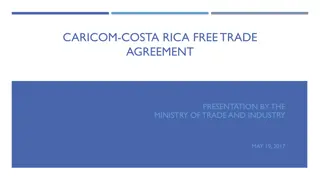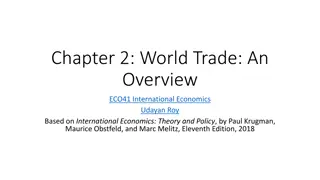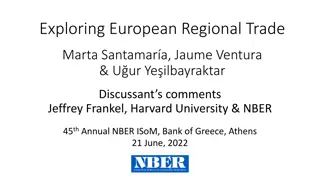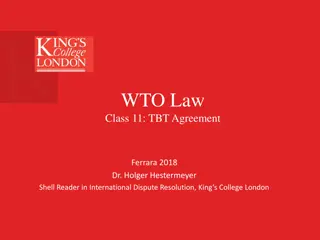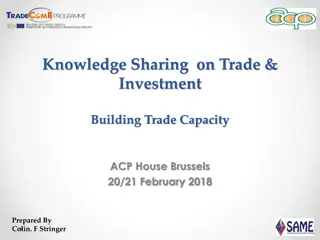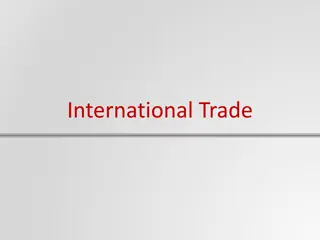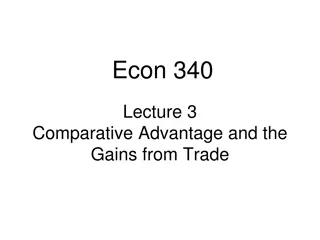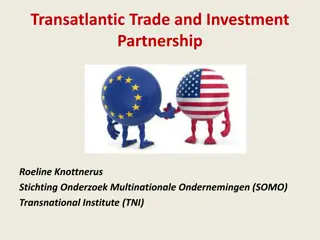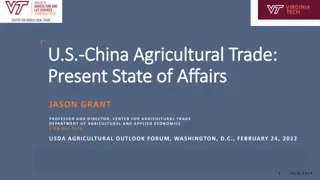Melanesian Spearhead Group (MSG) Trade Agreement Overview
This overview provides information on the Melanesian Spearhead Group Trade Agreement (MSGTA), its background, objectives, parties involved, preferential treatment accorded, rules of origin, and more. The agreement aims to enhance intra-regional trade, promote fairness and competition, and contribute to the deepening of MSG integration through tariff liberalization and elimination of protectionist mechanisms.
- Melanesian Spearhead Group
- MSG Trade Agreement
- International Trade
- Regional Integration
- Tariff Liberalization
Download Presentation

Please find below an Image/Link to download the presentation.
The content on the website is provided AS IS for your information and personal use only. It may not be sold, licensed, or shared on other websites without obtaining consent from the author. Download presentation by click this link. If you encounter any issues during the download, it is possible that the publisher has removed the file from their server.
E N D
Presentation Transcript
The Melanesian Spearhead Group (MSG) Trade Agreement (MSGTA2) Technical Workshop on International Merchandise Trade Statistics Workshop Suva, Fiji; 26 Feb-02 Mar 2018
Overview of Presentation Background Information Objectives of the MSG Trade Agreement (MSGTA) Scope and Coverage Qualification Criteria for Preferential Treatment Towards the Melanesian Free Trade Agreement (MFTA)
Parties Fiji Papua New Guinea Solomon Islands Vanuatu Parties to the MSGTA2
Background Information 1993: Original MSGTA entered into force (PNG, Solomon Islands and Vanuatu. Fiji joined in 1996) 2005: MSGTA2 was adopted and still in force MSGTA1 positive list; MSGTA2 negative list Members (except Solomon Islands) agreed to an 8-year tariff liberalization schedule Fiji & Vanuatu without a negative list but PNG exceptions mackerel, salt & sugar Solomon Islands: liberalization schedule by 2017, given ramifications of 1998-2002 socio-economic events
Objectives of the MSGTA2 To enhance intra-regional trade and contribute to the deepening of MSG integration through the gradual liberalization of tariffs on goods imported from other MSG countries To contribute to the harmonious development and expansion of world trade through the gradual reduction and/or elimination of other protectionist mechanisms To promote fairness and competition in trade
Preferential Treatment Accorded Goods are eligible for preferential treatment if they originate from MSGTA2 Parties i.e. originating goods Rules of Origin criteria is therefore key Article 13 and Annex III set out conditions for goods to qualify as originating
Rules of Origin Article 13 and Annex III Article 13 Preferential Treatment states: 1. For the purpose of this Agreement, goods and services shall be accepted as eligible or preferential treatment, if such trade- the rules of origin applicable to this Agreement as set forth in Annex III; or (a) originate in the Parties in accordance with (b) as specified in Schedule II to this Agreement
Preferential Treatment- Product Coverage All originating Goods not under the Negative List or excluded under Article 9.5 Article 9.5 provides for the exclusion of the following goods from receiving preferential treatment Chapter 22- Beverages, Spirits and Vinegar except products falling under HS Codes 2201, 2202 & 2209 Chapter 24 Tobacco and manufactured tobacco substitute Chapter 27 Mineral fuel, mineral oils and products of their distillation; bituminous mineral waxes and Cane sugar HS Code 1701 1100
How to Determine Origin Qualifications Criteria Wholly Produced or Obtained in the Territory of a Party Sufficiently Worked in a Territory OR
A. Wholly Produced or Obtained Goods Paragraph 1 of Annex I describes Wholly produced or obtained goods as goods that contain no materials imported from outside the MSGTA area 2 Categories: 1. Products that have been obtained in an unprocessed state 2. Products that are produced in the territory of an MSGTA from products exclusively derived from that country
A. Wholly Produced or Obtained Goods Raw Products; or Not undergone any manufacturing processes; or Does not contain foreign parts or inputs Eg. Mineral products extracted from the soil or seabed of a Party Vegetable products Products obtained from fishing or hunting Goods produced exclusively from products of a Territory of an MSGTA2 Party with no foreign inputs
B. Goods that are Sufficiently Worked Manufactured or processed goods that comprise materials that have not all been derived from MSGTA Parties, but processing activities have been undertaken in MSGTA Parties Change of Tariff Heading (CTH) Criteria is used to determine whether a good has been sufficiently worked
Change of Tariff Heading (CTH) Criteria Products are considered to be sufficiently worked or undergone substantial transformation if in the course of processing there has been a change in the tariff heading of the HS Code in the last two (2) digits of the six (6) digit tariff heading; and The new tariff heading of the HS Code must be different from the headings of all the non-originating materials used in the manufacturing process Processes that merely facilitate preservation, shipment, storage, transportation or simple repackaging DO NOT qualify under products to be granted preferential treatment
Private Sector Perspectives of MFTA General aversion: Benefits for some and not for all Lack of awareness of MSGTA privileges, requirements, forms, Trade Facilitation themes & reforms Lack of MSGTA trade data for business planning Unilateral policy shifts without consultations: duty & visa fee exemption vs. (unannounced) imposition Disconnects: Govt/Private Sector; Intra-Govt; Intra- Private Sector & Minister/Border Official 2017 Fiji/PNG Business Council AGM: 50% fall in trade due to food biosecurity issues between Fiji & PNG
Moving Forward: MFTA A more comprehensive Free Trade Agreement Negotiations concluded in 2016 (MSGTA 34p vs. MFTA 287p) Focuses on further deepening integration and economic development through: Trade in Services liberalization Enhanced Labour Mobility provisions Cross-Border Investment Regional Value Content of 30% Safeguards (10yrs LDCs; 5yrs DCs) Customs, Trade Facilitation, SPS, TBT (standards, tech, reg, conformity) 2 Countries have signed (Fiji and Solomon Islands) Instruments of Ratification not yet deposited so NOT yet entered into force
Moving Forward: TradeCom TradeCom II Programme Capacity Building Project (in preparation for MFTA) Dimension 1: Strengthening MSG Secretariat s Trade Division to effectively monitor intra-regional and international trade flows (Trade Statistics) Dimension 2: Identifying air and shipping connectivity bottlenecks and recommending suitable Trade Facilitation improvements Dimension 3: Improving access to trade-related tools and information Validation Workshop, Port Vila, 15 March 2018
Vinaka vakalevu Tank tu mas Tank yu tru Oleti Thank you & Merci Henry Sanday Trade and Investment Division MSG Secretariat h.sanday@msg.int



